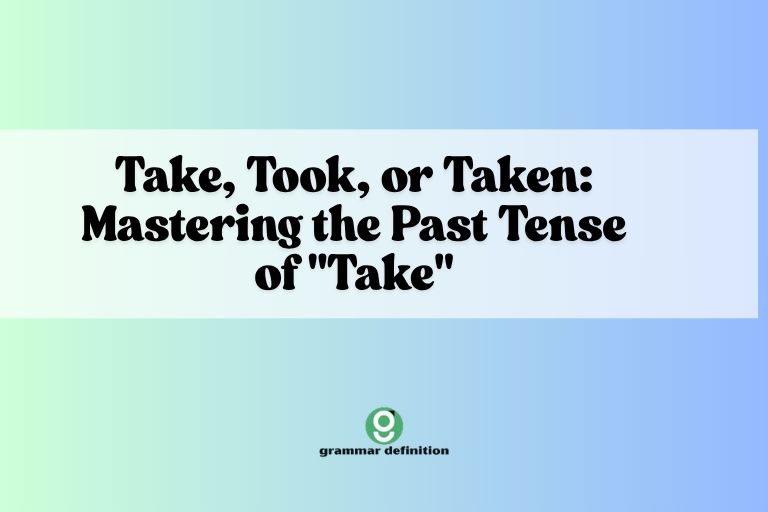Take, Took, or Taken: Mastering the Past Tense of “Take”

Understanding the correct past tense forms of irregular verbs like “take” is crucial for clear and effective communication in English. The verb “take” is a common and versatile word, but its irregular past tense forms – “took” and “taken” – often cause confusion.
This article provides a comprehensive guide to mastering the use of “take,” “took,” and “taken,” offering clear explanations, numerous examples, and practical exercises to help you confidently navigate these forms. Whether you’re a beginner or an advanced learner, this guide will equip you with the knowledge and skills to use “take” correctly in any context.
This guide is designed to benefit learners of all levels who want to improve their understanding and use of English grammar. From students preparing for exams to professionals seeking to refine their writing skills, this article offers valuable insights and practical tips for mastering the past tense forms of “take.” By the end of this article, you will be able to confidently use “take,” “took,” and “taken” in your speaking and writing.
Table of Contents
- Definition of “Take,” “Took,” and “Taken”
- Structural Breakdown
- Types and Categories of Usage
- Examples of “Take,” “Took,” and “Taken”
- Usage Rules
- Common Mistakes
- Practice Exercises
- Advanced Topics
- FAQ
- Conclusion
Definition of “Take,” “Took,” and “Taken”
The verb “take” is a versatile word with a wide range of meanings, from physically grasping something to accepting or assuming a role. Understanding its various forms is essential for accurate and effective communication.
Let’s break down the definitions and classifications of “take,” “took,” and “taken.”
Classification and Function
“Take” is an irregular verb, meaning its past tense and past participle forms do not follow the standard “-ed” ending. It functions as a transitive verb when it takes a direct object (e.g., “I take the book”) and as an intransitive verb when it does not (e.g., “The medicine will take effect”).
The principal parts of the verb “take” are:
- Base Form: take
- Past Simple: took
- Past Participle: taken
- Present Participle/Gerund: taking
Contexts of Usage
The verb “take” can be used in various contexts, including:
- Physical Action: To grasp or seize something. (e.g., “Take this pen.”)
- Accepting: To receive or accept something. (e.g., “Take my advice.”)
- Assuming: To assume a role or responsibility. (e.g., “Take charge of the project.”)
- Transportation: To transport or carry someone or something. (e.g., “Take the bus.”)
- Duration: To require a certain amount of time. (e.g., “It takes an hour.”)
Structural Breakdown
Understanding the structure of sentences using “take,” “took,” and “taken” is crucial for correct usage. Each form plays a specific role in different tenses and grammatical constructions.
Let’s examine the structural elements and patterns.
Base Form “Take”
The base form “take” is used in the present tense and with modal verbs. It indicates an action happening now or a general truth.
Structure: Subject + take/takes + (object/complement)
Examples:
- I take the bus to work every day.
- She takes her dog for a walk in the morning.
- They take pride in their accomplishments.
Past Simple “Took”
The past simple “took” is used to describe actions that were completed in the past. It is not used with auxiliary verbs.
Structure: Subject + took + (object/complement)
Examples:
- I took the exam yesterday.
- She took a picture of the sunset.
- They took a vacation last summer.
Past Participle “Taken”
The past participle “taken” is used in perfect tenses (present perfect, past perfect, future perfect) and passive voice constructions. It always requires an auxiliary verb (e.g., have, has, had, is, are, was, were).
Structure (Perfect Tenses): Subject + have/has/had + taken + (object/complement)
Structure (Passive Voice): Subject + is/are/was/were + taken + (by + agent)
Examples (Perfect Tenses):
- I have taken the medicine.
- She has taken on a new project.
- They had taken the necessary precautions.
Examples (Passive Voice):
- The book was taken from the library.
- The cookies were taken by the children.
- The decision has been taken by the committee.
Types and Categories of Usage
The verb “take” has numerous meanings and is used in a variety of contexts. Understanding these different types of usage can help you use “take,” “took,” and “taken” more accurately.
Physical Action
This category involves the physical act of grasping, seizing, or carrying something.
Examples:
- Take this bag for me.
- She took the keys from the table.
- The package has been taken to the post office.
Accepting or Receiving
This category involves accepting something offered or receiving something given.
Examples:
- Take my apologies.
- He took the compliment graciously.
- The bribe was never taken.
Assuming Responsibility
This category involves assuming a role, duty, or responsibility.
Examples:
- Take charge of the meeting.
- She took responsibility for the error.
- The project has been taken over by a new manager.
Transportation
This category involves using a mode of transportation.
Examples:
- Take the train to New York.
- He took a taxi to the airport.
- The bus has already been taken.
Duration or Time
This category involves the amount of time required for something.
Examples:
- It takes an hour to drive there.
- The meeting took two hours.
- The repairs have taken longer than expected.
Examples of “Take,” “Took,” and “Taken”
To further illustrate the usage of “take,” “took,” and “taken,” let’s examine a comprehensive set of examples organized by tense and context. Understanding these examples will solidify your understanding of how to use these forms correctly.
Present Tense Examples (“Take”)
The following table provides examples of “take” used in the present tense, demonstrating its various meanings.
| Sentence | Context |
|---|---|
| I take the subway to work every morning. | Transportation |
| She takes her coffee with sugar and milk. | Preference |
| They take pride in their work. | Emotion/Attitude |
| He takes responsibility for his actions. | Responsibility |
| We take a break every two hours. | Routine |
| The doctor takes my blood pressure at each visit. | Medical |
| The company takes customer feedback seriously. | Business |
| The lesson takes about an hour to complete. | Duration |
| She takes after her mother in appearance. | Resemblance |
| He takes advantage of every opportunity. | Opportunity |
| I take notes in class every day. | Education |
| She takes care of her younger siblings. | Responsibility |
| They take turns doing the dishes. | Routine |
| He takes criticism well. | Character |
| We take reservations for dinner. | Business |
| The medicine takes effect quickly. | Effectiveness |
| She takes the lead in group projects. | Leadership |
| He takes a walk in the park every evening. | Routine |
| We take our time when making important decisions. | Decision-making |
| The teacher takes attendance at the beginning of class. | Education |
| The dog takes a nap in the afternoon. | Routine |
| I take my vitamins every morning. | Health |
| She takes pride in her garden. | Hobby |
| They take the situation seriously. | Attitude |
| He takes the blame for the mistake. | Responsibility |
| We take a moment to appreciate the beauty around us. | Appreciation |
| The chef takes great care in preparing the meal. | Profession |
| She takes dance lessons twice a week. | Hobby |
| He takes his job very seriously. | Profession |
Past Simple Examples (“Took”)
The following table provides examples of “took” used in the past simple tense, illustrating completed actions in the past.
| Sentence | Context |
|---|---|
| I took the train to Chicago last week. | Transportation |
| She took a picture of the mountains. | Action |
| They took a vacation to Hawaii. | Travel |
| He took responsibility for the accident. | Responsibility |
| We took a break after working for hours. | Action |
| The doctor took my temperature. | Medical |
| The company took a risk with the new product. | Business |
| The meeting took longer than expected. | Duration |
| She took after her grandmother in personality. | Resemblance |
| He took advantage of the sale. | Opportunity |
| I took notes during the lecture. | Education |
| She took care of her sick friend. | Responsibility |
| They took turns driving on the road trip. | Routine |
| He took the news calmly. | Reaction |
| We took a taxi to the hotel. | Transportation |
| The medicine took effect immediately. | Effectiveness |
| She took the initiative to organize the event. | Leadership |
| He took a walk in the park yesterday evening. | Routine |
| We took our time to savor the meal. | Action |
| The teacher took attendance at the start of class. | Education |
| The cat took a nap on the sofa. | Routine |
| I took my umbrella because it was raining. | Preparedness |
| She took a deep breath before the performance. | Preparation |
| They took the challenge head-on. | Attitude |
| He took the blame to protect his friend. | Responsibility |
| We took a moment to admire the view. | Appreciation |
| The chef took pride in his culinary creations. | Profession |
| She took singing lessons as a child. | Hobby |
| He took his pet to the vet. | Responsibility |
Past Participle Examples (“Taken”)
The following table provides examples of “taken” used in perfect tenses and passive voice, demonstrating its role in these constructions.
| Sentence | Context |
|---|---|
| I have taken the exam already. | Present Perfect |
| She has taken on a new role at work. | Present Perfect |
| They had taken all the necessary precautions. | Past Perfect |
| The decision has been taken by the board. | Passive Voice |
| The cookies were taken from the jar. | Passive Voice |
| He has taken a leave of absence. | Present Perfect |
| We have taken the opportunity to travel. | Present Perfect |
| The course had been taken before. | Past Perfect |
| All seats have been taken. | Passive Voice |
| The dog has been taken for a walk. | Passive Voice |
| I have taken detailed notes during the meeting. | Present Perfect |
| She has taken excellent care of her elderly parents. | Present Perfect |
| They have taken turns cooking dinner. | Present Perfect |
| He has taken the criticism to heart. | Present Perfect |
| We have taken a break from our routine. | Present Perfect |
| The medicine has taken effect quickly. | Present Perfect |
| She has taken the lead on the project. | Present Perfect |
| He had taken a walk in the park before it rained. | Past Perfect |
| We have taken the time to plan our vacation. | Present Perfect |
| The exam has been taken by all students. | Passive Voice |
| The cat has taken shelter under the porch. | Present Perfect |
| I have taken my medication as prescribed. | Present Perfect |
| She has taken a course in photography. | Present Perfect |
| They have taken the situation seriously. | Present Perfect |
| He has taken the blame for the error. | Present Perfect |
| We have taken a moment to reflect on our achievements. | Present Perfect |
| The cake has been taken out of the oven. | Passive Voice |
| She has taken up painting as a hobby. | Present Perfect |
| He has taken his responsibilities seriously. | Present Perfect |
Usage Rules
To ensure correct usage of “take,” “took,” and “taken,” it’s essential to understand the specific rules governing each form. These rules dictate when and how each form should be used in different grammatical contexts.
Rule 1: “Take” in the Present Tense
Use “take” in the present tense for actions happening now, habitual actions, or general truths. Remember to use “takes” for third-person singular subjects (he, she, it).
Examples:
- I take the bus to school.
- She takes her dog for a walk every morning.
- He takes pride in his work.
Rule 2: “Took” in the Past Simple Tense
Use “took” to describe actions that were completed in the past. It does not require an auxiliary verb.
Examples:
- I took the exam yesterday.
- She took a photo of the sunset.
- They took a vacation last year.
Rule 3: “Taken” in Perfect Tenses
Use “taken” as the past participle in perfect tenses (present perfect, past perfect, future perfect). It always requires an auxiliary verb (have, has, had, will have).
Examples:
- I have taken the medicine. (Present Perfect)
- She has taken on a new project. (Present Perfect)
- They had taken the necessary precautions. (Past Perfect)
Rule 4: “Taken” in Passive Voice
Use “taken” in passive voice constructions. It requires a form of the verb “be” (is, are, was, were, been).
Examples:
- The book was taken from the library.
- The cookies were taken by the children.
- The decision has been taken by the committee.
Rule 5: Common Expressions with “Take”
Some common expressions use “take” in specific ways. Here are a few examples:
- Take care: To wish someone well.
- Take a break: To pause and rest.
- Take your time: To not rush.
- Take advantage of: To make good use of an opportunity.
Common Mistakes
Even experienced English speakers sometimes make mistakes with “take,” “took,” and “taken.” Understanding these common errors can help you avoid them in your own writing and speaking.
Mistake 1: Using “Take” Instead of “Took” in the Past Simple
Incorrect: I take the exam yesterday.
Correct: I took the exam yesterday.
Explanation: “Took” is the correct past simple form of “take.”
Mistake 2: Using “Took” Instead of “Taken” in Perfect Tenses
Incorrect: I have took the medicine.
Correct: I have taken the medicine.
Explanation: “Taken” is the correct past participle form used with “have.”
Mistake 3: Omitting the Auxiliary Verb with “Taken”
Incorrect: The book taken from the library.
Correct: The book was taken from the library.
Explanation: “Taken” requires an auxiliary verb (was, is, have, etc.).
Mistake 4: Using “Take” with an Auxiliary Verb in the Past
Incorrect: I had take the medicine.
Correct: I had taken the medicine.
Explanation: When using an auxiliary verb such as ‘had’, you must use the past participle ‘taken’.
Mistake 5: Confusing “Take” with Similar Verbs
Incorrect: I bring the book to school yesterday.
Correct: I took the book to school yesterday.
Explanation: ‘Take’ implies carrying something to a different location, while ‘bring’ implies carrying something to the speaker’s location.
Practice Exercises
Test your understanding of “take,” “took,” and “taken” with these practice exercises. Each exercise focuses on different aspects of using these forms correctly.
Answers are provided at the end of each exercise.
Exercise 1: Fill in the Blanks with “Take,” “Took,” or “Taken”
Fill in the blanks with the correct form of “take” (take, took, taken).
| Question | Answer |
|---|---|
| 1. I will _____ the bus to work tomorrow. | take |
| 2. She _____ a picture of the sunset yesterday. | took |
| 3. They have _____ all the necessary precautions. | taken |
| 4. The book was _____ from the library. | taken |
| 5. He _____ responsibility for his actions. | took |
| 6. We _____ a break after working for hours. | took |
| 7. The doctor _____ my temperature. | took |
| 8. The company has _____ a risk with the new product. | taken |
| 9. It _____ an hour to drive there. | takes |
| 10. She has _____ after her grandmother in personality. | taken |
Exercise 2: Choose the Correct Form
Choose the correct form of the verb “take” in each sentence.
| Question | Answer |
|---|---|
| 1. He (take/took/taken) the opportunity to travel last summer. | took |
| 2. I have (take/took/taken) my medicine this morning. | taken |
| 3. She (take/took/taken) the lead in the project. | took |
| 4. They (take/took/taken) a walk in the park every evening. | take |
| 5. The decision was (take/took/taken) by the committee. | taken |
| 6. We (take/took/taken) our time to enjoy the scenery. | took |
| 7. The teacher (take/took/taken) attendance at the beginning of class. | takes |
| 8. The cat has (take/took/taken) a nap on the sofa. | taken |
| 9. I (take/took/taken) my umbrella because it was raining. | took |
| 10. She will (take/took/taken) singing lessons next year. | take |
Exercise 3: Correct the Mistakes
Identify and correct the mistakes in the following sentences.
| Question | Corrected Answer |
|---|---|
| 1. I take the bus yesterday. | I took the bus yesterday. |
| 2. She have took the exam. | She has taken the exam. |
| 3. They had take the precautions. | They had taken the precautions. |
| 4. The book was took from the shelf. | The book was taken from the shelf. |
| 5. He take responsibility for his actions last week. | He took responsibility for his actions last week. |
| 6. We has take a break after working hard. | We have taken a break after working hard. |
| 7. The doctor taken my temperature. | The doctor took my temperature. |
| 8. The company have took a risk. | The company has taken a risk. |
| 9. It take an hour to get there yesterday. | It took an hour to get there yesterday. |
| 10. She had take after her grandmother. | She had taken after her grandmother. |
Advanced Topics
For advanced learners, understanding more nuanced uses of “take” can further enhance your command of English. This section explores complex aspects of using “take,” including phrasal verbs and idiomatic expressions.
Phrasal Verbs with “Take”
“Take” is frequently used in phrasal verbs, which combine “take” with a preposition or adverb to create a new meaning. Here are some common examples:
- Take after: To resemble someone, usually a family member. (e.g., “She takes after her mother.”)
- Take off: To depart or remove. (e.g., “The plane will take off soon.” or “Take off your shoes.”)
- Take on: To assume a responsibility or task. (e.g., “She took on the challenge.”)
- Take over: To gain control of something. (e.g., “The company was taken over by a competitor.”)
- Take up: To start a new hobby or activity. (e.g., “He took up painting.”)
Idiomatic Expressions with “Take”
“Take” is also used in many idiomatic expressions, which have a meaning that is different from the literal meaning of the individual words. Here are some examples:
- Take it easy: To relax and not worry.
- Take for granted: To underestimate the value of something.
- Take with a grain of salt: To not believe something completely.
- Take the bull by the horns: To confront a difficult situation directly.
- Take the plunge: To make a bold decision.
FAQ
Here are some frequently asked questions about using “take,” “took,” and “taken,” along with detailed answers to help clarify any remaining confusion.
- When should I use “take” versus “took”?
Use “take” in the present tense for actions happening now or habitual actions. Use “took” in the past simple tense to describe actions that were completed in the past. For example, “I take the bus every day” (present) versus “I took the bus yesterday” (past). - How do I know when to use “taken” instead of “took”?
Use “taken” as the past participle with auxiliary verbs (have, has, had, is, are, was, were) in perfect tenses and passive voice constructions. For example, “I have taken the medicine” (present perfect) or “The book was taken from the library” (passive voice). - What are some common mistakes to avoid with “take,” “took,” and “taken”?
Common mistakes include using “take” instead of “took” in the past simple, using “took” instead of “taken” in perfect tenses, and omitting the auxiliary verb with “taken.” Always double-check your tense and sentence structure. - Can you give more examples of phrasal verbs with “take”?
Certainly! Here are a few more examples: “take back” (to retract), “take down” (to write down), “take in” (to understand), “take out” (to remove), and “take through” (to guide). - How do I use “take” in the passive voice?
In the passive voice, “taken” is used with a form of the verb “be” (is, are, was, were, been). The structure is: Subject + be + taken + (by + agent). For example, “The cake was taken by the children.” - What’s the difference between “take” and “bring”?
“Take” implies carrying something from the speaker’s location to another place, while “bring” implies carrying something to the speaker’s location. For example, “Take this book to the library” (away from me) versus “Bring the book to me” (towards me). - How can I improve my usage of “take,” “took,” and “taken”?
Practice is key! Try writing sentences using each form in different contexts. Read English texts and pay attention to how these forms are used. Do exercises and quizzes to test your understanding. The more you practice, the more natural it will become. - Are there any regional differences in how “take” is used?
While the basic grammar rules remain consistent across different regions, some idiomatic expressions and phrasal verbs with “take” might be more common in certain areas. Pay attention to the context and be aware that some expressions might not be universally understood.
Conclusion
Mastering the correct usage of “take,” “took,” and “taken” is essential for clear and accurate communication in English. By understanding the definitions, structural rules, and common mistakes associated with these forms, you can significantly improve your writing and speaking skills.
Remember to pay attention to the tense of the sentence and the role of auxiliary verbs when using “take” in its various forms.
To further enhance your understanding, continue practicing with exercises, reading English texts, and paying attention to how native speakers use “take,” “took,” and “taken” in different contexts. With consistent effort and attention to detail, you will confidently and accurately use these forms in all your communication.






